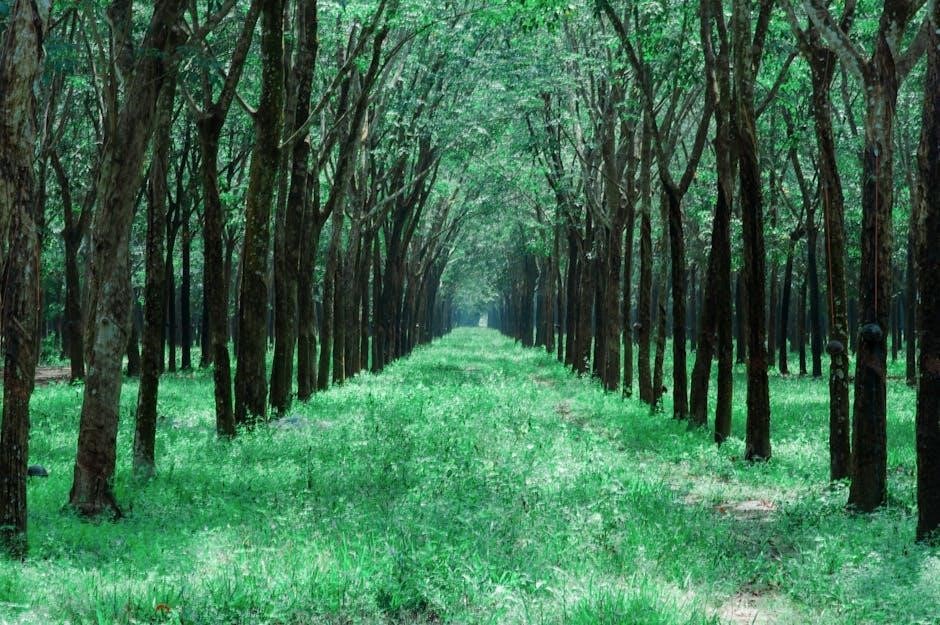Herblore is a members-only skill in Old School RuneScape that allows players to create potions using herbs and secondary ingredients․ These potions provide various effects, such as skill boosts or protection against poison․ It is a versatile skill that can be trained quickly but often requires significant investment․ Potions are crafted by combining herbs with secondary components, offering temporary benefits to players․ Herblore is essential for enhancing gameplay and is a popular skill among players due to its utility in combat and skilling activities․

1․1 What is Herblore?
Herblore is a members-only skill in Old School RuneScape that focuses on creating potions using herbs and secondary ingredients․ Potions can provide temporary skill boosts, protection, or other beneficial effects․ Players craft these by combining herbs with specific components, such as eyes of newt or vials of water․ This skill is essential for enhancing gameplay, offering utility in combat, skilling, and survival․ Herblore requires knowledge of ingredients and their combinations, making it a versatile and rewarding skill to master․
1․2 Importance of Herblore in Old School RuneScape
Herblore is a vital skill in Old School RuneScape, enabling players to craft potions that provide essential benefits such as skill boosts, healing, and protection․ These potions are crucial for activities like PvM, PvP, and skilling, offering a competitive edge․ High-level potions, such as Super Restore and Antifire, are indispensable in challenging content․ Herblore also enhances survival and efficiency, making it a cornerstone skill for progression․ Its utility and versatility make it highly valued, as mastering potion creation can significantly improve gameplay outcomes and overall success in Gielinor․

Getting Started with Herblore
To begin Herblore, complete the Druidic Ritual quest, granting level 3․ Gather essential herbs and secondary ingredients to craft potions․ Combine herbs with vials of water or other liquids to create restorative or enhancing effects, forming the foundation of your Herblore journey․
2․1 Completing the Druidic Ritual Quest
Starting Herblore requires completing the Druidic Ritual quest, a short and straightforward mission․ This quest introduces players to the basics of potion-making and automatically grants level 3 Herblore․ It sets the stage for further skill progression by unlocking essential recipes and providing foundational knowledge․ Completing this quest is a mandatory step, ensuring players understand the fundamentals of combining herbs with secondary ingredients to create effective potions․ Once done, players can begin their Herblore journey, crafting potions to aid in their adventures․
2․2 Essential Items for Herblore
To practice Herblore, players need a few key items․ Vials of water, blood, or coconut milk are the base for most potions․ Herbs, both clean and grimy, are primary components, while secondary ingredients like eyes of newt or unicorn dust vary by potion․ A pestle and mortar is crucial for grinding ingredients․ Additional items like an alchemist’s amulet or amulet of chemistry can enhance efficiency․ Stocking these items ensures smooth progression through the skill, allowing players to craft a wide variety of potions effectively․ Proper preparation with these essentials is vital for successful Herblore training․

Understanding Potion Making
Potion making is central to Herblore, involving the combination of herbs and secondary ingredients in vials of water, blood, or coconut milk to create potent effects․
3․1 The Potion Making Process
The potion making process involves combining a herb with a secondary ingredient in a vial of water, blood, or coconut milk․ Players gather herbs and ingredients, then use them on the vial to create potions․ Each potion has specific effects, such as boosting skills or granting protection․ The process begins after completing the Druidic Ritual quest, which unlocks Herblore․ Potions can be made efficiently by banking quickly after each batch, allowing up to 2,500 potions per hour․ This method is fast but requires significant investment․
3․2 Key Ingredients: Herbs and Secondary Components
Herbs are the primary components in potion making, each offering unique properties․ Players obtain herbs through farming, monster drops, or purchasing from the Grand Exchange․ Secondary ingredients, such as eyes of newt or dragon scales, are added to activate specific potion effects․ These components vary depending on the potion recipe, ensuring diverse outcomes․ Efficient training requires stockpiling these ingredients to maintain a steady supply, as they are essential for crafting potions effectively․ Proper use of these components ensures successful potion creation and maximizes experience gain․

Training Pathways
Herblore training offers multiple pathways, including cost-effective methods, fast progression, and profitable techniques․ Each approach caters to different priorities, whether focusing on budget, speed, or financial gain․
4․1 Cheap Pathway to Level 99
The cheap pathway to level 99 Herblore focuses on minimizing costs while progressing steadily․ Players often opt for low-cost potions like Attack Potions and Weak Curatives, which use affordable ingredients․ Cleaning grimy herbs is another budget-friendly method, offering moderate experience and profit through auto-cleaning or manual processing․ Additionally, making Tar is a cost-effective alternative, requiring fewer ingredients but yielding consistent experience․ This pathway is ideal for players with limited resources, balancing expense with gradual skill advancement․
4․2 Fast and Efficient Methods
The fastest way to train Herblore is by making high-experience potions quickly․ Using secondary ingredients with unfinished potions allows players to craft around 2,500 potions per hour․ Banking efficiently is crucial to maintain speed․ Additionally, the Mastering Mixology minigame, unlocked at higher levels, provides rapid experience, especially when using the Alchemist’s Amulet for enhanced efficiency․ This method is ideal for players seeking swift progression to level 99, balancing speed with effective resource use and maximizing their efficiency in the process to achieve optimal results․
4․3 Profitable Training Techniques
Profitable Herblore training involves making high-demand potions like Saradomin Brews or Super Energies, which can be sold for significant profit․ Using alchemy amulets reduces ingredient costs, making certain potions more economical․ Cleaning grimy herbs is another slow but profitable method, yielding steady returns․ Players can also decant potions into 4-dose variants to increase value․ Combining efficient methods with market demand ensures both experience gain and financial gain, making Herblore a rewarding skill to train for those focused on profitability and long-term success in Old School RuneScape․

Tips for Ironman Accounts
Ironman accounts require careful resource management to maximize efficiency in Herblore training․ Utilize quest rewards and experience lamps to boost progress without spending coins․ Humidify can create water sources for Guthix Rest, reducing costs․ Cleaning grimy herbs provides steady experience and profit․
5․1 Managing Resources Effectively
For Ironman accounts, managing resources in Herblore is crucial․ Cleaning grimy herbs provides steady experience and profit, while using alchemy amulets reduces secondary ingredient costs․ Stockpiling herbs and secondary components ensures consistent training without frequent purchases․ Utilizing the humidify spell to create water sources saves coins and enhances efficiency․ Additionally, making Guthix Rest in bulk minimizes waste and maximizes resource use․ Prioritizing cost-effective methods like tar-making or cleaning herbs helps conserve funds while progressing steadily toward higher levels․
5․2 Utilizing Quest Rewards
Quests like Druidic Ritual, Jungle Potion, and Recruitment Drive provide valuable Herblore experience and items․ Completing these early on boosts your initial levels and unlocks essential potion recipes․ Quest rewards often include rare herbs or secondary ingredients, reducing costs․ For Ironmen, using quest rewards minimizes reliance on the Grand Exchange, conserving resources․ Prioritize quests with Herblore benefits to maximize efficiency and accelerate your progression․ This approach aligns with effective resource management, a cornerstone of successful Ironman accounts․

Advanced Herblore Techniques
Mastering Mixology minigame offers high XP and exclusive rewards․ Using Alchemy Amulets enhances potion efficiency․ Advanced techniques include optimizing high-value potions and decanting for maximum benefits․
6․1 Mastering Mixology Minigame
The Mixology minigame is unlocked after completing Children of the Sun and offers high XP rates․ At level 81 Herblore, players can earn up to 105,000 XP per hour․ The minigame requires no herbs or secondary ingredients, making it efficient․ It also rewards exclusive items like the Alchemist’s Amulet and Prescription goggles․ This activity is ideal for advanced players seeking high efficiency and unique rewards, enhancing their Herblore experience significantly․
6․2 Using Alchemy Amulets for Efficiency

Alchemy amulets significantly enhance Herblore efficiency by reducing costs․ The Alchemist’s Amulet and Amulet of Chemistry boost potion value, saving money․ They are especially effective for high-value potions, allowing players to minimize expenses while maintaining fast XP rates․ These amulets are crucial for optimizing training, particularly for those aiming to reach level 99 efficiently․ By using these items wisely, players can balance cost and speed, making their Herblore journey more economical and productive․

Supplementary Activities
Supplementary activities like cleaning grimy herbs and making tar offer additional experience and profit opportunities, enhancing your Herblore journey with cost-effective and efficient training methods․
7․1 Cleaning Grimy Herbs
Cleaning grimy herbs is a slow but profitable method for training Herblore․ Since an update, auto-cleaning cleans all herbs in the inventory, yielding 3,000 herbs per hour․ Manual cleaning can double this rate, with experienced players cleaning over 10,000 herbs hourly․ This method offers consistent experience and profit, especially when selling cleaned herbs․ For those with high Magic levels, the degrime spell from Arceuus can also clean herbs, granting Magic XP alongside Herblore gains, making it a versatile option for skillers․
7․2 Making Tar for Additional Experience
Making tar is a cost-effective method for gaining Herblore experience․ It involves combining swamp tar with herblore ingredients, requiring fewer clicks than potion making․ While slower, it offers consistent XP and can be profitable․ Stockpiling swamp tar is crucial, as its buy limit is low․ This method is ideal for players seeking to save money while training․ Tar production is less intensive, making it a viable alternative to potion crafting for those prioritizing efficiency and cost-effectiveness in their Herblore journey․




